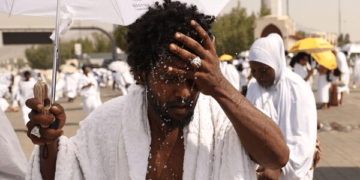Here’s what science says about blood moon food, health, and pregnancy myths. Blood moon 2025: Debunking food, health, and pregnancy myths
The second-to-last lunar eclipse of the year, a rare total event, is set to light up the skies for billions of people, including those in the UAE and Saudi Arabia, on September 7.
This stunning spectacle will turn the moon a striking red, but it also revives ancient myths. From warnings for pregnant women and fears of bad luck to the belief that food becomes unsafe, science has debunked these claims. A lunar eclipse is simply a beautiful natural alignment of the Earth, Sun, and Moon.
Astronomers note that this will be among the longest lunar eclipses in recent years, unfolding in distinct phases before reaching its peak.
Get ready for a stunning celestial event! UAE residents are in for a treat as a dramatic Blood Moon will grace the skies from the night of September 7 to the early hours of September 8. Stargazers can expect a mesmerizing spectacle as Earth’s shadow blankets the lunar surface in a deep, crimson hue.
Also In This Package
Why September’s Corn Moon is also a ‘Blood Moon’
Why September’s Corn Moon is also a ‘Blood Moon’
‘Blood Moon’ explained: A visual guide to the red glow
How to watch rare blood moon total lunar eclipse in UAE
Throughout history, eclipses have been shrouded in myth and superstition, despite the scientific explanation of the Earth, Sun, and Moon’s alignment. Lunar eclipses, in particular, were seen as harbingers of danger, transformation, or divine interference across many cultures.
- In India, traditions advise people to stay indoors, abstain from cooking, and avoid using sharp objects during an eclipse.
- Aboriginal Australian traditions viewed them as a bad omen, often associating them with sickness or a disruption of balance.
- The Ancient Egyptians imagined the eclipse as a sow devouring the Moon.
- Chinese mythology explained the phenomenon as a celestial dragon taking a bite out of the Moon.
Popular myths about lunar eclipses
Pregnancy myths: Some believe expectant mothers should avoid stepping outdoors, fearing scars or birthmarks on the baby. Science confirms a child’s physical traits are determined by DNA and development — not eclipses.
Food myths: Many avoid cooking or eating, believing food becomes unsafe. In reality, eclipses have no effect on food safety.
Eye safety: Unlike solar eclipses, lunar eclipses are completely safe to watch with the naked eye.
Nature myths: Some say plants, water, or animals behave strangely. Science finds no evidence of harmful effects — unusual animal behaviour is anecdotal.
Disaster myths: Eclipses are often linked to earthquakes, floods, or bad luck. Astronomers confirm these celestial events have no connection to natural disasters.
Debunking health and food superstitions
Eating and cooking – No scientific evidence shows food becomes “poisonous” during an eclipse.
Exercise – Safe to work out; accidents are unrelated to eclipses.
Mental health – No direct link to anxiety, sadness, or mood changes.
Fasting and rituals – These practices hold cultural and religious meaning but lack scientific support.
Frequently asked questions
- Do lunar eclipses contaminate food or water?
No. Science confirms food and water remain unaffected. - Can we eat meat during the eclipse?
Yes. There’s no evidence linking eclipses with food safety. - Does a lunar eclipse have side effects?
No. A lunar eclipse does not impact human health. - What should we avoid during a lunar eclipse?
Nothing — except missing the chance to see it. The blood moon phase, when the Moon glows red, is safe and unforgettable.
The bottom line
A lunar eclipse is simply the Earth’s shadow falling on the Moon. It is one of the most striking spectacles in the night sky — and completely safe. For families in the UAE and beyond, September 7 is a chance to step outside, look up, and enjoy the Moon turning red: a natural wonder to be admired, not feared.










































































